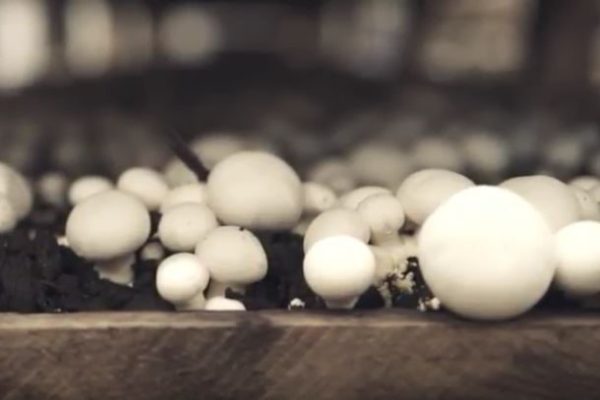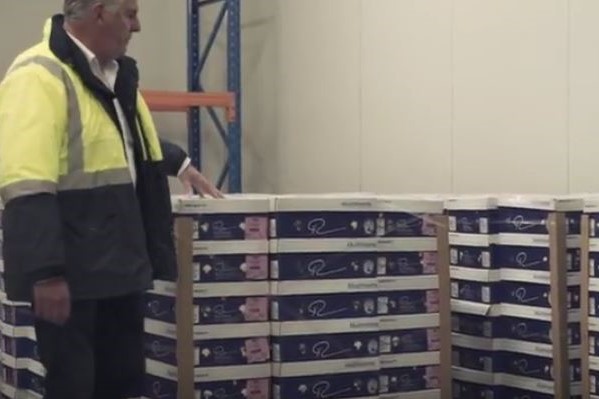The opening of a major new composting facility is just the latest stage in Phil Rogers’ mission to build a truly great mushroom business. As Managing Director of P & L Rogers since 2006, his vision has helped to drive growth to the point where 75 people are now employed producing 35 tonnes of mushrooms each week – the second highest production in South Australia.
Phil sees quality as the single most important driving force for a great business, and said that a good working environment is the crucial first step towards achieving it: “We want to create a beautiful product that people can enjoy, and that needs work from an entire team. P & L Rogers is a great place to work – we try to make sure that people have ownership and confidence, and that they enjoy coming here. It’s what made us a sustainable operation, and one that has gone from strength to strength. Many of our people have been here for over 20 years.”
Controlling the unpredictable
High quality mushrooms depend on a well-prepared substrate – the better the substrate, the better the quality mushrooms will be. Raw compost is made from wheat straw, chicken litter, water and gypsum, it goes through a de-composition process for approximately 20 days. After that, it is then pasteurised to rid predictive mould which takes six days. This process is done in a specially designed tunnel system. The next step after pasteurisation is to inoculate the substrate with mushroom spawn, it then undergoes a spawn run where it is again loaded back into another tunnel with critical climate control set points and is given up to 16 days where the spawn fully colonises the substrate. After this, it is loaded into trucks and carted to the farm, loaded into trays, peatmoss is applied, then taken to the growing rooms where it’s watered daily to maintain a high level of moisture. This process triggers a pin-head size mushroom, which doubles in size every 24 hours until harvesting commences about six or seven days later.

Phil said that mushrooms have to be white, smooth, bright and long-lasting: “We’re not trying to be the biggest producer, but rather the best producer. That means controlling as many variables as we can, and one of the biggest variables is the substrate. We’ve been freighting in compost from my father-in-law’s farm, all the way from Merbein South near Mildura, for several years which has become cost prohibitive and limits our capacity. This is why we have decided to build our own composting facility anticipated to be operational by April/May 2018.”
Managing risk
Phil travelled the world between 2004 and 2006 as a mushroom consultant, across Australasia, South Korea, China, South America, North America and Canada. When buying the farm from his father-in-law in 2006, he structured a deal where he leased the farm until he bought it outright in 2011. He said that business owners should be careful not to over-expose themselves financially: “Small steps and calculated risks are key. My approach has always been to do the best I can with the resources I have, and that has paid dividends in mushroom farming where little things can make a huge difference – tweaking different production steps carefully has set our products apart.”
Promoting growth
When Phil took over the farm in 2006, the farm was producing 24 tonnes of mushrooms per week. A few immediate improvements, including opening up another six growing rooms, meant production increased to 35 tonnes per week with very little additional cost.
Locating and developing his new composting facility in SA took five years of research, but he now has control over the whole supply chain (and all three phases of mushroom production). He can also look at selling compost as an additional revenue stream.
“The new composting facility is a huge investment,” said Phil, “it will take us at least 12 months to train four to five new staff members with the techniques of compost making. It will also allow us to fill our current cropping area more comprehensively which is expected to increase our current production from 35 tonnes to 40+ tonnes per week, and employ a further 10 to 15 people at the farm in Woodcroft.
What we’ve gained is a state-of-the art facility that will serve us well into the future. Of course we still have to control external costs such as power, water and red tape.”

Phil has also been delighted with the service from AHO: “Our relationship has been one of the most pleasant working relationships in my career. Their advice is professional and expert – and AHO has been especially helpful with sourcing funding for the new composting facility, and supporting strategic business planning.”
In terms of the future, Phil is excited about the opportunities the new composting facility will bring, and may also consider expanding the mushroom growing side of the business, but only if they can still produce the best quality mushrooms in South Australia.
 "
"